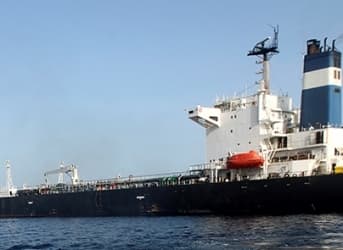When Libya announced that it had reached a deal with a group of rebel fighters led by Ibrahim Jathran who were blockading its oil export terminals, the energy markets reacted with relief. Oil prices went down to under $103 following the news. The end of force majeure at the country’s eastern ports came just as production from the massive Sharara oil field ramped up, which is expected to bring Libya’s total production quota at some 1 million barrels per day (bpd) by the end of the year -- from the current low of 325,000 bpd. If you add to the equation the approximately 7 million barrels stored in the ports of Es Sider and Ras Lanuf, the state can expect a much needed cash windfall this year.
But can it last?
Libya has one of the most vulnerable economies in the world, as its government revenues depend 90 percent on oil exports. In Gaddafi’s times, the country averaged some 1.65 million bpd and had plans to expand production capacity to 3 million bpd. With a domestic consumption of just 300,000 bpd, Libya’s net pre-war exports stood at roughly 1.4 million bpd, used almost exclusively to satisfy the needs of Italy, France, Germany and Spain.
Moreover, Tripoli could become an essential piece in Europe’s energy mix, once its 3.2 million tones per year (tpy) LNG plant at Marsa El Brega goes online again. Built in the 70s, it was one of the first such plants in the world but low gas prices and a climate of constant instability ever since the 2011 military intervention have left it in a dire state of disrepair.
Related Article: Libyan Oil Ports Open, But Need Work Before Exports Resume
The symptoms of the so-called “resource curse” are clearly evident: On account of its inhospitable geography and thanks to its strategic position on the tip of North Africa, Libya could only exploit its single significant wealth. But herein lies its greatest vulnerability. While tapping into the 47 billion barrels of light, sweet crude (80 percent of which are located in the east) can certainly transform the country from the war-torn desert that is today into a Western-minded regional hub, it can also keep Libya teetering on the edge for years to come.
The blockade was no accident but a carefully laid plan by Jathran and his group. A separatist from eastern Libya, he has been one of the leaders of the 2011 revolution. For his efforts, he received the job of head of the Petroleum Security Guard, a position he used to push his own political ideas. Distrustful of Tripoli’s central government and armed with a profound hate for all Islamic elements in the Parliament, he seized the ports at gunpoint in August 2013 hoping to blackmail his way into breaking off Libya’s historical eastern province of Cyrenaica from the rest of the country.
Once the blockade was in place, Jathran set about to create a regional government – the Cyrenaica Political Bureau – and even made headlines when he tried to sell a batch of oil worth $30 million to a North Korea tanker called Morning Glory, a feat that caused the Prime Minister to resign. Why? Because following the seizure of Libya’s export terminals, Tripoli declared that any attempt to sell the oil would be considered an act of banditry. When the central government failed to prevent the Morning Glory from spiriting away with its cargo, it became clear to what extent the Prime Minister had lost control over Cyrenaica.
Through the recently concluded deal, the government agrees to pay the salaries of the port guards who defected to Jathran’s group and to offer amnesty to all involved. This is just an initial “sign of goodwill” that is meant to pave the way for more comprehensive talks and negotiations. It is highly unlikely, though, that the barely functional government of Tripoli will satisfy the demands of the group, which include greater autonomy and a better distribution of the oil wealth. The situation on the ground remains tense and so is the prospect of reintegrating Libya in the international oil markets.
Indeed, when oil is used by splinter groups in their bid for regional autonomy, it is clear that the initial softening in the global oil price can only be short-lived. Libya’s internal divisions are still there and any subsequent compromise that Jathran will reach with Tripoli is bound to create even more problems. The warlord’s actions are even dismissed by a great number of his countrymen as power plays meant to propel him to the national political arena.
Related Article: Safe Bets in an Unsafe World
A potential catchall solution has been proposed by a number of governmental figures though. As the country has embarked on the tedious process of hashing out a new constitution, the Libyan Foreign Minister has proposed to restore the fundamental ideas of the 1951 Constitution, chiefly the federalization of the country in three distinct provinces and a restoration of the constitutional monarchy, unseated by Gaddafi in 1969.
ADVERTISEMENT
So many elements depend on the Libyan variable. Lower oil prices, caused by a resumption of Libyan exports, would diminish the feasibility of the U.S. shale boom and would also reduce the amount of spare cash the energy sector will have on hand for future investments. It follows that the need for a contingency plan for Libya is more acute than ever, as its topsy-turvy dynamics can only promote volatility in energy markets. While some may be content with the recent deal, we must not forget that this is only a stopgap solution for Libya’s structural problems.
By Scott Belinski for Oilprice.com


















